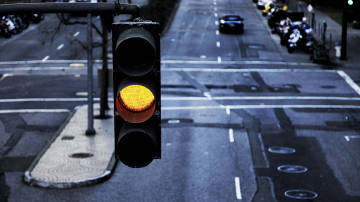
Lee Romanov
Published on Tuesday, Jun. 01, 2010

A reader writes: Can you fight a ticket that came about from being involved in an accident?
Here’s what happened: I was going through an intersection with a traffic light. Just before I entered the intersection the light turned yellow. There was a car waiting to turn right onto my street and I guess he thought I was going to stop, so he proceeded to turn right on red, and we collided. The police officer gave me a ticket for disobeying the amber light and failing to stop.”
I was not at fault for this accident and I’m deeply disturbed I was ticketed for going through a yellow light. With this ticket, and accident, it makes it look like it was my fault and will dramatically affect my insurance rate. How can I fight this?
There’s a two-part process you’ll need to go through to ensure your insurance rate isn’t affected.
You need to go to court to get the ticket for the accident dropped. Then you’ll need to ensure your insurance company doesn’t find you at-fault for the accident.
The police determine if a law has been broken. Your insurance company determines who was at fault for the accident. The rules for determining fault vary from province to province, but the bottom line is it’s the “fault” which affects your insurance rate.
Ironically, even if you’re not ticketed in connection with the accident by the police, your insurance company could still find you at fault for the accident. However, it’s much easier to fight a fault ruling from your insurer when you haven’t been charged or ticketed.
But bear this in mind: Many drivers don’t know a yellow light means STOP - unless it’s unsafe to do so. An example of being “unsafe to stop” would be if there was a car behind you, and if you were to suddenly brake they may hit you. Other mitigating factors may be the road or weather conditions.
If your argument in this case is that you thought you could run a yellow light, you’ll lose.
Some important points to remember:
• To fight the ticket successfully, you need to understand the letter of the law. I’d suggest you seek out professional counsel such as a lawyer or a legal representation firm that specializes in traffic tickets.
• Before going to court, try to remember what you said at the scene of the accident. You may not realize what you said could be used against you in court. You may have said something that caused you to appear guilty when you weren’t. An example of this is if the officer asked, “Did you see the car before you hit it?” If you answered “no,” the police officer might determine you weren’t paying attention, and were driving carelessly. A better response would be, “by the time I saw the car it was too late to avoid the collision.”
• When the officer decides to charge you for the accident, they need to advise you that you're not obligated to say anything unless you wish to do so. But anything you say may be used as evidence in court. So if you continued to say something such as “I’m late for work”, it may be used as evidence to support the assumption you were speeding through the yellow light. The question is, did the officer advise you of this? If they didn’t they can’t use what you said as evidence.
• When you enter into the courtroom be fully prepared, with supporting evidence. If you're found to be fumbling around with your notes and delaying the court proceedings, you may indirectly be prejudicing yourself against the courts for an unfavorable verdict. Bring supporting evidence - for example, if the weather was a mitigating factor, a weather report from the day of the accident would be helpful.
• Understand how court proceedings work. Traffic court is unlike any other in that it has to establish a balance between the high volume of cases, limited time to spend on each case, and the need to adhere to a strict set of procedural rules.
For example: One very important procedural rule that often trips non-experts up is that of hearsay evidence.
I asked Brian Lawrie, founder of traffic-ticket legal specialists POINTTS, for his thoughts on this. He says: “You can’t provide evidence to a non-guilty plea by saying that the guy at the news stand said he saw the car just pull out at the last second. You would have had to subpoena that person as a witness to allow their statement as evidence. At the same time, if the officer provides photos of the accident, the person who took the photos needs to be present for them to be used as evidence. Any number of these kinds of pieces of evidence, not properly presented could allow your case to be dismissed. That’s why good representation is critical.”
Assuming you’re the next Perry Mason and your case gets dismissed or you’ve been found not guilty, your next step is to become a master negotiator to ensure your insurance company now considers you not-at-fault for the accident. I’ll be addressing that part of the process in next week’s column.